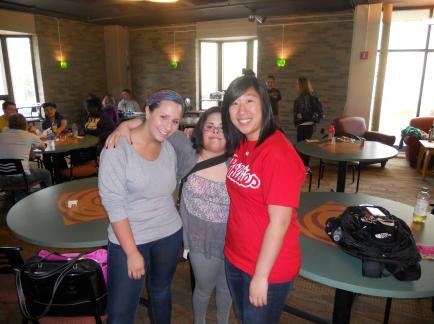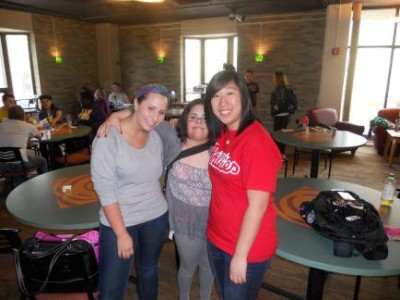Lesson Learned From Our Journey Of Inclusive Education by Martin and Darcy Elks

This article appeared in the periodical Thinking About School Inclusion (2012). Issue 12 pp 10-13. Belonging Matters. Melbourne

Martin and Darcy Elks live in Pennsylvania. They have three children, one of which has a disability. Mary has experienced the same opportunities in life that have been available to her brother and sister, including a mainstream education. Darcy is also an educator, consultant and advocate and her work has been to encourage attitudes, models and structures which promote social value and the inclusion of people with a disability and others who have been marginalized, devalued and excluded from society. Martin began his career as a psychologist in Victoria, Australia. He went to Syracuse University in 1986 to do doctoral work in disability studies. Since then he has worked as a behavior specialist and in supporting self-determination, school inclusion and advocacy.
Advocacy is hard work, and advocacy in schools is a long and difficult adventure. As we near the end of out 16 years of advocacy for inclusive education for our daughter we would like to share some of the lessons we have learned the along the way. These lessons are offered for you to take or leave as you see fit. Our experience will be different to yours and you will face many situations we did not. We hope nevertheless, that our lessons will be an encouragement to you as you pave your own path.
- Inclusive education is the best preparation for adult life. If someone is included from an early age they will be able to explore personal interests and have the same experiences that their peers do. Hence, when the time comes to leave school the students who have had full inclusive school life are in a position of strength – they know what they like, what pathways to pursue, and are thinking about life in an inclusive way. Developing an inclusive mindset at 18 is very difficult after 18 years of exclusion.
- Mary (our daughter) is up to it –even the hard times – when things were tough and we were tempted to give in Mary kept going. For example, in grade 4 with Mrs (shall remain nameless) Mary persevered, endured and hung in there like a champion and did not complain once. Not that we would have minded if she had complained but she did not. In fact, Mary would encourage us to “hang in there”.
- Inclusion has a profound effect on people other than the person with a disability. One of Mary’s classmates named Kristen one day talked to us about how Mary had helped her to find her purpose in life. A teacher, Ms. Sarah, who we challenged to open up to the idea of Mary being included in regular classes in University, came to realize that she may have held some undiscovered
- There is great competence for inclusion in our communities and in typical citizens. Sometimes we are surprised by the sheer commonsense and positive attitude from the most unlikeliest of people. For example, one of Mary’s bus driver’s had the clearest understanding of who Mary was and the importance of inclusion for her and her peers. In college, a professor from a non-special education field personally invited Mary to join her classes because, among other things, she had grasped the concept and value of
- Sometimes some people are really opposed to or unable to grasp the ideas, values, practices, etc. behind inclusion. It is good to recognize when this is the case and simply move on to find people who do embrace inclusion. And we have found that there are plenty of people who when given the opportunity to learn about and participate in inclusive practice are very open. Those are the people we would recommend putting energy
- A committed ally can make all of the difference. One person who “clicks” with Mary and the ideas of inclusion can make lots of progress in a short period of time. A lot of time can be wasted trying to convince people of what is relatively well accepted by many
- Trust your instincts and see for yourself. After we had been badgered and promised wonderful things by the school about “direct instruction” of reading we reluctantly agreed to try it out. We went into the classroom and were horrified. Mary was sitting behind a desk with one other student in an otherwise empty classroom. There were two aids and one teacher. The walls were bare except for some very old notices and torn class work. The teacher read from a scripted lesson plan while the aids looked on and standing ominously behind the two desks. It reminded me of an interrogation room. Needless to say we pulled her from that “direct instruction” very
- Use the regular school resources. Why on earth, when there are very competent reading specialists, trained and experienced in teaching reading, do people insist on the special education teacher teaching reading? Why, when there are very experienced guidance counselors, does the school insist that special educators provide career advice for students with disabilities? Career advice for special education students can easily end up being which sheltered workshop would be closest to your home? When you want to be in the regular community it pays to use the regular
- Never underestimate what your child is picking up in classes. We were repeatedly told that the curriculum is too hard for Mary but we know she learned a lot. For example, to this day Mary will put her fingers on her neck during exercise and say “heart beat.” She will remind us constantly that smoking makes you sick and that alcohol is a poison. When she is terrified by a storm at night we can remind her that it is “just science” and she recalls the lesson on the weather from her science teacher. Mary has had a lot of adaptations and modifications but it is amazing how much of the non-adapted she has grasped.
- Other students are ready and willing to advocate for students with disabilities. While it is true that “kids can be cruel” it is also true that kids can be kind. One year when Mary was being treated as a child and shouted at by the special education “resource teacher” a group of her classmates went to the principal’s office and stood up for
- Sometimes it is important for the adults to get out of the way!
- Avoid standardized tests and “cognitive assessments” in general. As a recovering psychologist I (Martin) attest to the fact that we (and other professionals) are masters at finding deficits and problems in (other) humans. Giving permission for a “cognitive assessment” is giving carte blanche to a professional to write page after page of issues your son or daughter is now discovered to have. These deficits usually find there way into a super label like ADHD or autism or I.D. which will stay with your son or daughter for most of their life. If you find yourself unable to avoid giving such permission, insist on only those tests that have real world relevance to teachers in the classroom and try to choose the psychologist that will administer the tests. While rare, there are some good ones out
- In the same vein, insist that no IQ score is put on any sheet of paper. To this day we do not know our daughter’s IQ and we have no interest in finding out (it is in somebody’s drawer somewhere). A so-called sub-average IQ will have a negative influence far in excess of it’s worth. People will make all sorts of predictions about “potential” and before long they will all come
- Beware of compromises. Little compromises turn into big sell-outs. This is one reason why parents have a reputation for being unreasonable. It takes a great deal of trust to be willing to compromise and the phase “go along to get along” has severe limitations for inclusion
- Every parent knows how much their child can take at school, whether it is bullying, stigma or rejection. Juggling the balance is a judgment call we all have to make. How much are the sacrifices for change in school worth the effect those schools have on your child? In the final analysis, your child’s wellbeing comes
- You need a thick skin to survive the decade or more of advocacy you may need to engage in at school. It may seem personal at times (and it may be personal at times) but the big picture is not personal. At the deepest level it is not about you or your child at all, it is about how we view disability and the significance of the social transformation that we are asking to be made. The dynamics being played out are large and systemic, they just happen to be focused on your child right now so it feels very personal.
- Just because you have achieved great things for your son or daughter does not mean the system has changed. It just means it has made an exception for you. Once you are through the system is very capable of reverting back to the way it was before you made so many waves. The only way around this is to organize and radicalize others (when you have the time).
- Inclusion is worth it (even with the struggles). Mary is now a confident young woman, moving in a positive direction, going through the day as her own person, working, socializing, and knowing how to conduct herself in many different situations and social contexts, willing to take risks— all the things we want from all our children. Good luck, and may the wind be always at your back!
